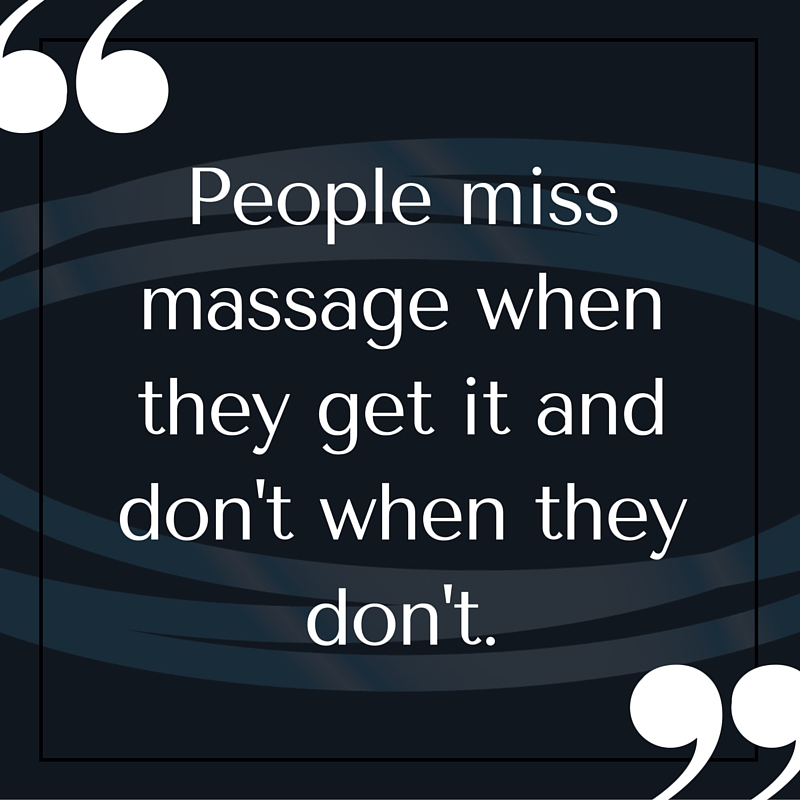Massage is hard to put in a personal budget or business budget.
People – as consumers – include massage services in their actual spend, as do companies. So, why is there a reluctance to put massage in the budget?
The simple and incorrect answer is that people do not ‘value’ massage.
We know people value massage because people are spending their personal money on massage services. It’s estimated Australian’s spend 1.3 Billion annually on medically-referred massage, sports massage, relaxation, remedial and spa massage. This figure excludes sexual-massage. These businesses all exist because people buy these non-sexual massage services.
The same goes for the corporate world where we see companies spend on massage. There is massage purchased for staff, for prospects and clients, on audiences at their events and on suppliers in their supply chain.
It’s a paradox.
Why if people and companies are getting massages and see the benefit don’t they clearly include massage in the budget?
People don’t want to put good things in the budget.
Budgets must be dry, conservative, necessary spends. Even if it is necessary to have a good culture, employee engagement, energetic team and healthy staff to get a good financial return, no one wants to put massage in the budget. Culturally it is “too far”.
People don’t think they can justify the expense and so hide it.
In the corporate world a departmental budget tells people further up the “food-chain” what the person creating the budget views as important. No manager wants to put massage in a budget for fear of looking frivolous. Including massage as a budget item would be a reputation risk for most managers.
It is a sad fact that it’s easier to justify extra recruiting costs when you lose staff or get absenteeism than it is to invest in making the workforce feel better.
This is ridiculous when you consider the marginal impact of spending a few dollars on massaging per person, per year, compared to replacement costs, but that’s the truth of it.
People who do like massage are not sure where the costs belong
Despite the reputation risk of budgeting for massage many companies and departments still love to get massages (15 years of 3 Minute Angels is testament to that fact).
So decision-makers find loopholes where they include the budget they think they’ll spend on massage with other programs. Over the years at 3 Minute Angels we’ve seen the massage budget get attached to Internal Communications Programs, Stationary Procurement Costs, Marketing and New Product Development Programs, Relocation Expenses and more. But no client has ever told us outright they have a budget line item for staff massages.
Massage is missed when present and not when absent.
Do you have a friend who is great fun, lovely and for some reason you never catch up with?
Do you sometimes go a long time between catching up?
When you do finally see that friend, you have a great time and find yourself asking “why did we go so long between catch-ups?” Well it’s similar with most people and their relationship with massage.
People miss massage when they get it and don’t when they don’t.
People in Australia love to get massages.
If you want proof of this go to Bali, Thailand or the Philippines where massage is cheap with a bunch of Australians. You’ll find at the right price many Australians get massages and make it part of their daily holiday routine.
Out of sight out of mind
Straight after a massage most people’s only complaint is that it didn’t go long enough.
Straight after a massage you feel less stressed at worst and “Divine” if all goes well.
At 3 Minute Angels we capture this mood-change and use it to show our client the positive impact we’ve made in each persons mood via the massage. (Click these links or more on the Halo Effect and Key Contact Reporting). We capture this information and feed it back quickly because we know from experience that in a weeks time you will treat us like that great friend you never catch up with often enough.
You will get on with other things. Depending on how long since your last massage you may not even think of massage when constructing the budget.
So should massage make it into more budgets?
The short answer is: Yes.
The longer answer is that decision makers should be honest about the benefits and use of massage within their business. It follows that they should be honest about the need for it in a budget.
Whilst we have massage budgets hidden within other budgets you erode the benefit of providing the massages and being right about that decision.
You already know massage is popular with employees because these same employees are getting massages for themselves outside of work. In case you needed more evidence here are 10 reasons staff love massage.
Massages in the workplace is proven to create good cultures. That’s why 5 of the top 10 rated ‘Best Places To Work’ use 3 Minute Angels.
Massage is proven to make a tangible difference to each individual. Short seated massages are cost effective and convenient to implement in almost any workplace.
Massage should not be hidden. Massage should not be short-hand for “frivolous managers” it should be short-hand for “enlightened managers”.
At 3 Minute Angels we would like to see massage come out and be proudly included in budgets, so we can help you defend the choice against the costs of bad cultures, sick and disengaged staff, recruitment and absenteeism….
If you would like to get massages at work and in the budget but need help, then get in touch.

